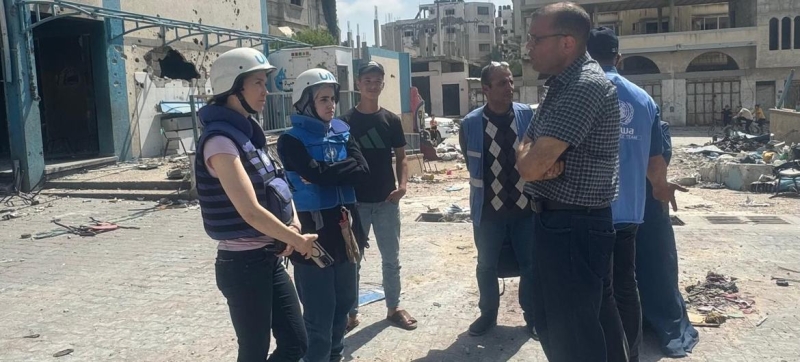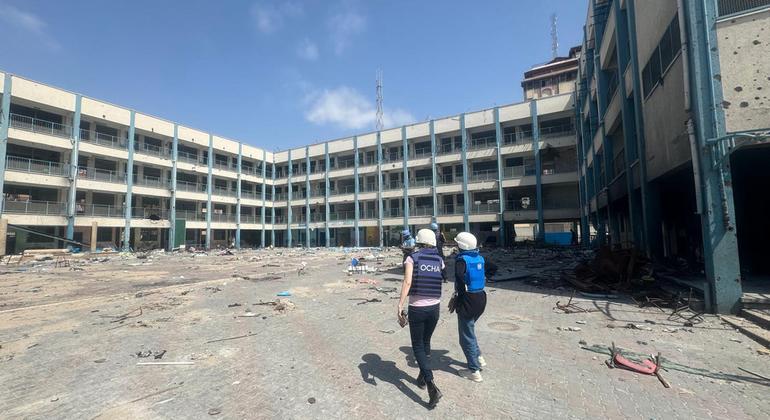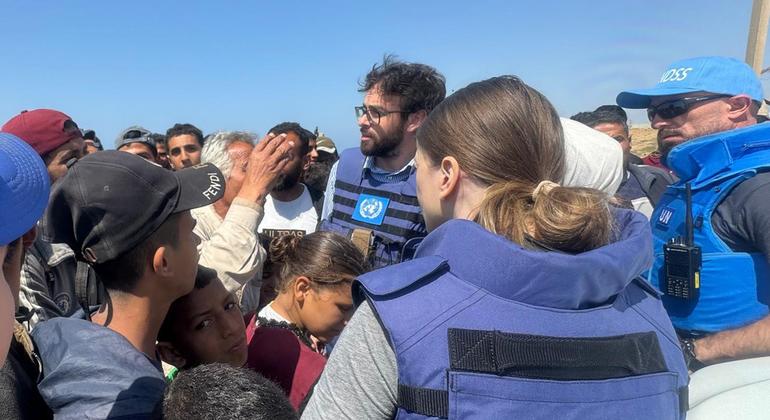
Olga Cherevko is a communications specialist at the UN Office for the Coordination of Humanitarian Affairs. INTERVIEW | UN employee in Rafah: “I have never seen such grief anywhere” Peace and Security
Gaza’s southernmost city, Rafah, has dominated the news coming out of the war-torn enclave in recent weeks. Despite constant shelling and the proximity of ground battles, UN humanitarian aid workers continue to work in Rafah. Among them is Olga Cherevko, communications specialist at the Office for the Coordination of Humanitarian Affairs (OCHA). In an interview with Nargis Shekinskaya from the UN News Service, Olga spoke about what is happening now in Rafah.
Olga Cherevko: I have been working for the UN for twenty years, but even when I did not work in the Organization, I often visited the so-called hot spots , and I have never seen such suffering, such grief anywhere. I was here in 2014, and I remember then we thought that that war was the worst thing that happened, and that the mark would remain unforgettable. No one could have imagined that ten years later it would be so terrible and how much more grief [the new war] would bring.
I worked in Afghanistan, Liberia, Syria, Iraq, Yemen… Everything in Gaza was destroyed. Every time I go into the city, I’m just shocked. I don’t recognize the area where I lived ten years ago at all. Bombings continue every day, planes fly, and all this has become so familiar to people here that it is also shocking. You hear children laughing and playing outside the window, and at the same time bombs are falling and black smoke from explosions rises.

A huge number of people endlessly move from one place to another because they are sent evacuation orders. Right now, almost half of our population has moved from Rafah in two weeks. More than 800 thousand people moved to Khan Yunis.
People live in appalling conditions, there are tents everywhere because buildings are destroyed. Tents are most often made from sheets or plastic bags. There are no toilets, no water, it’s very hot now, so access to water is very important…
NS: Are you not afraid? ?
OR: You know, I’ve even gotten used to it, because I’ve been working in this environment for so many years. We must not forget that we are here – as humanitarian workers, as UN employees – we are the most protected people. If you look at the settlements that you can see from the window, you immediately understand that they are much less protected than we are. Nevertheless, something constantly happens to us, convoys come under fire, attacks, and so on. Of course, working is dangerous. But I’m still much more protected than an ordinary person here, unfortunately.

.
NS: You communicate with the local population?
RV: Yes, of course. Every day.
NS: In what language? In Arabic?
OR: I speak some Arabic. But many people here speak English, even Russian and Ukrainian, because at one time many local doctors studied either in Ukraine or in Russia. Therefore, there is no problem finding a common language.
I communicate with people who have already moved five, six, seven, eight times in these seven months. I hear stories from them that are very difficult to describe. The trace that will remain after this war will, of course, last for decades. Several generations will remember this.
NS: Can you share a story that stuck in your soul?
VR: I spoke with one person who was evacuated for medical reasons. He says: “I lost everything. I lost my home, I lost a lot of relatives, I lost my neighbors.” His two-year-old granddaughter died, his brother died, and he was separated from his family. I asked him what he hoped for? He said: “I hope that somehow we will survive.”
One girl looked at me for a very long time , and then came up and said: “Sorry, you look a lot like my best friend, who was recently killed.” She’s a doctor, this girl. She now works in centers where they help people after bombings and other incidents. Despite everything she’s been through, she still gets up every morning to go to work, she looks death in the face and continues to help others.
NS: I look at you now and see that when you talk about these people, you can hardly hold back your tears. How do you yourself cope with this emotional load?
OC: We manage somehow, because we have a very good team. Many of us have known each other for a long time, we work well together. Half of the people who work on our team are from Gaza themselves. They themselves suffered. Their families suffered. We talk a lot, exchange experiences and impressions.
The most important thing here now is that the war stops and that we can receive humanitarian aid. There is a huge need here and a lot of people who need to be helped.
Read also:
